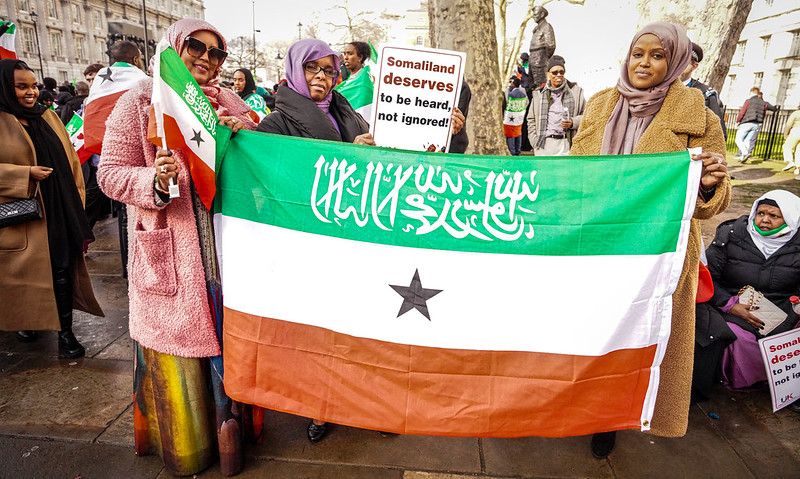
Somaliland, a self-declared republic in the Horn of Africa, held its fourth general election since its 1991 secession from Somalia on Wednesday, with global recognition of the state an issue for both leading candidates.
Despite establishing its own government, parliament, currency, and even issuing passports, Somaliland's independence remains unacknowledged globally. Somalia still claims Somaliland as part of its territory.
President Muse Bihi Abdi, who has led Somaliland since 2017, seeks re-election against opposition candidate Abdirahman Cirro. Core issues in this election include independence recognition and a territorial dispute over Las Anod, a contested region also claimed by Puntland—another Somali breakaway region that declared autonomy in 1998.

Photograph: Somailand activists in London, 2013. Alisdare Hickson.
Somaliland, a self-declared republic in the Horn of Africa, held its fourth general election since its 1991 secession from Somalia on Wednesday, with global recognition of the state an issue for both leading candidates.
Despite establishing its own government, parliament, currency, and even issuing passports, Somaliland's independence remains unacknowledged globally. Somalia still claims Somaliland as part of its territory.
President Muse Bihi Abdi, who has led Somaliland since 2017, seeks re-election against opposition candidate Abdirahman Cirro. Core issues in this election include independence recognition and a territorial dispute over Las Anod, a contested region also claimed by Puntland—another Somali breakaway region that declared autonomy in 1998.
The election comes after a landmark deal announced with Ethiopia earlier this year. In January, President Bihi and Ethiopian Prime Minister Abiy Ahmed signed a “port-for-recognition” memorandum, proposing Ethiopian use of Somaliland's Berbera port on the Red Sea. Ethiopia, Africa's largest landlocked country, currently relies almost entirely on Djibouti for maritime access, with Djibouti handling over 90% of its sea trade.
The agreement outlines that Ethiopia will conduct an “in-depth assessment” of Somaliland’s quest for official recognition. While Ethiopia has stopped short of promising recognition, officials in Somaliland view the deal as a potential pathway toward legitimacy on the world stage.
The port deal sparked diplomatic friction between Ethiopia and Somalia, whose government views it as an encroachment on Somali sovereignty. Somalia's Ministry of Foreign Affairs condemned the agreement, calling it an “outrageous” violation, with President Hassan Sheikh Mohamud warning parliament that Somalia would not tolerate any infringement on its territorial integrity. In response, Somalia expelled Ethiopian diplomats, and tensions between the two countries escalated.
At the United Nations General Assembly in October, Somali Prime Minister Hamza Abdi Barre called for international condemnation of Ethiopia's actions, alleging that Ethiopia sought to “annex parts of Somalia” under the pretext of securing sea access.
Both Somaliland’s presidential candidates support the agreement with Ethiopia, recognizing its strategic importance. According to Somaliland’s representative to Kenya, Mohamed A. Mohamoud, the government plans to finalize the port deal post-election, regardless of who wins.



